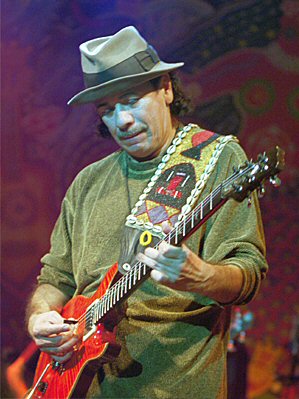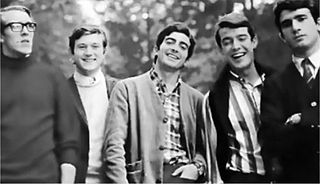Related Research Articles

Los Lobos is an Mexican-American rock band from East Los Angeles, California. Their music is influenced by rock and roll, Tex-Mex, country, zydeco, folk, R&B, blues, brown-eyed soul, and traditional music such as cumbia, boleros and norteños. The band rose to international stardom in 1987, when their version of Ritchie Valens' "La Bamba" peaked at the top of the Billboard Hot 100, and also topped the charts in the United Kingdom, and several other countries. Songs by Los Lobos have been recorded by Elvis Costello, Waylon Jennings, Frankie Yankovic, and Robert Plant. In 2015, they were nominated for induction into the Rock and Roll Hall of Fame. In 2018, they were inducted into the Austin City Limits Hall of Fame. They are also known for performing the theme song for Handy Manny.

Chicano rock, also called chicano fusion, is rock music performed by Mexican American (Chicano) groups or music with themes derived from Chicano culture. Chicano Rock, to a great extent, does not refer to any single style or approach. Some of these groups do not sing in Spanish at all, or use many specific Latin instruments or sounds. The subgenre is defined by the ethnicity of its performers, and as a result covers a wide range of approaches.
Agua Prieta is a town in Agua Prieta Municipality in the northeastern corner of the Mexican state of Sonora. It stands on the Mexico–U.S. border, adjacent to the town of Douglas, Arizona. The municipality covers an area of 3,631.65 km2. In the 2010 census the town had a population of 79,138 people, making it the seventh-largest community in the state, and a literacy rate of 96.3%.
Thee Midniters were an American rock group, among the first Chicano rock bands to have a major hit in the United States. They were one of the best known acts to come out of East Los Angeles in the 1960s, with a cover of "Land of a Thousand Dances" that charted in Canada in 1965, and an instrumental track "Whittier Boulevard" in 1965. Thee Midniters were among the first rock acts to openly sing about Chicano themes in songs such as "Chicano Power" and "The Ballad of César Chávez" in the late 1960s.

Andrés Montañez Rodríguez, better known as Andy Montañez, is a Puerto Rican singer and songwriter.

Originally, Trio Los Panchos were a trío romántico formed in New York City in 1944 by Alfredo Gil, Chucho Navarro, and the Puertorican Hernando Avilés. The trio became one of the leading exporters of the bolero and the romantic ballad in Latin America.

Mexican rock music, often referred to in Mexico as rock nacional, originated in the 1950s. Standards by The Beatles, Elvis Presley, The Everly Brothers, Nancy Sinatra, and Chuck Berry were soon covered by bands such as Los Apson, Los Teen Tops, Los Twisters, Los Hitters, Los Nómadas, Los Rockets, Los Rebeldes del Rock, Los Locos del Ritmo, Los Crazy Boys, and Javier Bátiz, which later led to original compositions, often in English. The group "Los Nómadas" was the first racially integrated band of the 1950s. Their lead guitarist, Bill Aken, wrote most of their original material, including the raucous Donde-Donde, and co-wrote the material for their Sounds Of The Barrio album, which is still being sold. Their 1954 recording of She's My Babe was the first top 40 R&B recording by a Latino band. In the southwestern United States, Spanish guitar rhythms and Mexican musical influences may have inspired some of the music of American musicians Ritchie Valens, Danny Flores, Sam the Sham, Roy Orbison, and later, Herb Alpert. Initially, the public exhibited only moderate interest in them, because the media attention was focused on La Ola Inglesa.
Rock music entered the Peruvian scene in the late 1950s, through listening to performers like Elvis Presley, Buddy Holly and Bill Haley, who popularized rockabilly in the United States. The first Peruvian rock bands appeared during this time. They included Los Millonarios del Jazz, Los Stars, Conjunto Astoria, Los Incas Modernos, and Los Zodiacs.
Chilean rock is rock music and its corresponding subgenres produced in Chile or by Chileans. Chilean rock lyrics are usually sung in Spanish so can be considered as part of rock en español, although sometimes are sung in English as well.

Trinidad López III was an American singer, guitarist, and actor. His first album included a cover version of Pete Seeger's "If I Had a Hammer", which earned a Golden Disc for him. His other hits included "Lemon Tree", "I'm Comin' Home, Cindy" and "Sally Was a Good Old Girl". He designed two guitars for the Gibson Guitar Corporation, which are now collectors’ items. A documentary on his life and career, "My Name is Lopez" was released in April 2022.

Germán Genaro Cipriano Teodoro Gómez Valdés y Castillo, known professionally as Tin-Tan, was a Mexican actor, singer and comedian who was born in Mexico City but was raised and began his career in Ciudad Juarez, Chihuahua. He often displayed the pachuco dress and employed pachuco slang in many of his movies, some with his brothers Manuel "El Loco" Valdés and Ramón Valdés. He made the language of the border Mexican, known in Spanish as fronterizos pachucos, famous in Mexico. A "caló" based in Spanglish, it was a mixture of Spanish and English in speech based on that of Mexicans on the Mexican side of the border, specifically Ciudad Juarez.
Rock and roll music was introduced in Cuba in the late 1950s, with many Cuban artists of the time covering American songs translated into Spanish, as was occurring in Mexico at the same time. "The Batista police never looked kindly on Rock and Roll, and much less after the screening of films like Rebel Without a Cause and The Bad Seed, among others. After 1959, Rock and Roll followed the same path, although artists like Argentinean Luis Aguile emerged."

Los Relámpagos del Norte were a Mexican norteño duo formed in the early 1960s by Cornelio Reyna and Ramón Ayala. Cornelio Reyna was the lead singer and bajo sexto player, while Ramon Ayala was the background vocalist and the accordion player. After successful careers together, Cornelio and Ramon parted ways in the early 1970s. They later reunited in 1995 to record a live album which was successful among their core audience.

Angélica María Hartman Ortiz, known professionally as La novia de Mexico, is a Mexican actress and singer. Her songs El hombre de mi vida peaked at No. 6, Reina Y Cenicienta peaked at No. 9, Prohibido (Prohibited) peaked at No. 13, and El Taconazo peaked at No. 34 on the hot Latin songs chart.

César Roel Schreurs, best known as César Costa, is a Mexican actor and rock-and-roll singer.
"Cotton Fields (The Cotton Song)" (also known as In Them Old Cotton Fields Back Home) is a song written by American blues musician Huddie Ledbetter, better known as Lead Belly, who made the first recording of the song in 1940.
Colombian Rock is rock music from Colombia. The most common styles of Colombian rock are based on Rock en Español, indie rock, as well as the traditional focus of hard rock Colombian bands.
Los Freddy's were a Mexican musical group, founded in 1962 in Guadalajara, Jalisco.

Los Sírex is a Spanish rock band founded in 1959 in Barcelona and active until 1972. In 1977 they got together again and were active until 2012. It was initially formed by three members: Guillermo Rodríguez Holgado, Antonio Miers and Manuel Madruga (Manolo), then briefly joined by the vocalist Santi Carulla in 1960. By the end of 1960, the band consisted of Antoni Miquel Cerveró as lead vocalist, Lluís Gomis on the drums, Josep Fontseré Portolés on the rhythm guitar, Guillermo Rodríguez Holgado on the bass and Manolo Madruga on the lead guitar. They named the band after a component of eyeglasses: Guillermo worked at his father's glasses factory, where they used a filament called Sírex to adjust the lenses to the frames of the glasses. They became identified with a pure rock and roll style with daring lyrics that caused them trouble with the Spanish censorship of the time. They sang in Spanish.

Luz Elena Ruiz Bejarano, more commonly known by her stage name Lucha Villa, is a Mexican singer and actress.
References
- ↑ "Los Apson: Leyendas y nostalgias – El Portal de la Gente". Elportaldelagente.mx. Retrieved 3 April 2019.
- ↑ Zolov, Eric (1999). Refried Elvis: The Rise of the Mexican Counterculture . University of California Press. pp. 103–104. ISBN 9780520215146.
- ↑ "Gran Grupo de los 60's Los Apson - HISTORIA". Losapson.es.tl. Retrieved 3 April 2019.